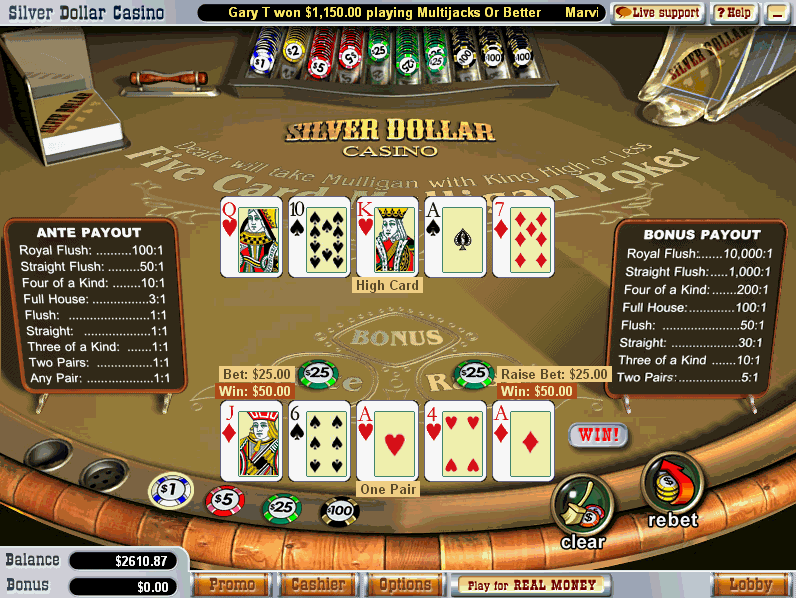On this page
Five-Card Mulligan Poker
Introduction
Five-Card Mulligan Poker is a defunct poker-based variation, which used to be found at Internet casinos formerly using Odds On software. The game is patented (patent number 7,735,830) by yours truly.
Following are the rules of the five-card version used by Odds On. Three and seven card versions have also been analyzed and covered by the patent application.
Rules
- A single 52-card deck is used.
- All hands are scored according to conventional poker rules.
- Play starts with the player making an ante bet. The player may optionally make a bonus bet as well.
- The dealer shall give each player five cards and himself five cards. The dealer's cards are dealt face down.
- The player has the choice to stand or take a Mulligan.
- If the player chooses to take a Mulligan, then he must make a raise bet equal to his ante bet. Players taking a Mulligan will exchange their original five cards for five new cards from the remaining cards in the deck. Taking a Mulligan will also forfeit the bonus bet, if made.
- The dealer will turn over his cards.
- If the dealer has an ace high or higher, then he will stand.
- If the dealer has a king high or less, then the dealer will take a Mulligan, discarding his hand for five new cards.
- The dealer will compare his own hand to the player’s hand, the higher hand wins. If the dealer has the higher hand, then the player will lose the ante and raise wager, if made. If the player has the higher hand, then both ante and raise will pay according to the ante and raise pay table below. A tie will result in a push.
- The bonus bet shall pay according to the pay table below.
Ante and Raise Pay Table
| Player Hand | Pays |
|---|---|
| Royal flush | 100 to 1 |
| Straight flush | 50 to 1 |
| Four of a kind | 10 to 1 |
| Full house | 3 to 1 |
| All other | 1 to 1 |
Bonus Bet Pay Table
| Player Original Hand | Pays |
|---|---|
| Royal flush | 10,000 to 1 |
| Straight flush | 1,000 to 1 |
| Four of a kind | 200 to 1 |
| Full house | 100 to 1 |
| Flush | 50 to 1 |
| Straight | 30 to 1 |
| Three of a kind | 10 to 1 |
| Two pair | 5 to 1 |
| All other | Lose |

In this example, the player bet $25, received a lousy hand, and exchanged it for another hand, making the required $25 raise bet. The dealer had ace high or higher so he stood. The player had the higher hand, so both ante and raise paid 1 to 1, for a $50 win.
Analysis
The following table shows the possible outcomes in Five-Card Mulligan. The lower right cell shows a house edge of 3.152%. The player will raise 45.24% of the time, for an average wager of 1.4524 units. The element of risk is thus 3.152%/1.4524 = 2.170%. The standard deviation is 1.610.
Five-Card Mulligan Return Table
| Event | Pays | Probability | Return |
|---|---|---|---|
| Player wins with nothing, bet of 1 | 1 | 0.015127 | 0.015127 |
| Player wins with pair, bet of 1 | 1 | 0.263124 | 0.263124 |
| Player wins with a two pair, bet of 1 | 1 | 0.044279 | 0.044279 |
| Player wins with a three of a kind, bet of 1 | 1 | 0.020721 | 0.020721 |
| Player wins with straight, bet of 1 | 1 | 0.003902 | 0.003902 |
| Player wins with flush, bet of 1 | 1 | 0.001956 | 0.001956 |
| Player wins with full house, bet of 1 | 3 | 0.00145 | 0.004349 |
| Player wins with four of a kind, bet of 1 | 10 | 0.000243 | 0.002431 |
| Player wins with straight flush, bet of 1 | 50 | 0.000014 | 0.000693 |
| Player wins with royal flush, bet of 1 | 100 | 0.000002 | 0.000153 |
| Player wins with nothing, bet of 2 | 2 | 0.0257 | 0.051401 |
| Player wins with pair, bet of 2 | 2 | 0.119065 | 0.238129 |
| Player wins with a two pair, bet of 2 | 2 | 0.01975 | 0.0395 |
| Player wins with a three of a kind, bet of 2 | 2 | 0.009114 | 0.018228 |
| Player wins with straight, bet of 2 | 2 | 0.001762 | 0.003523 |
| Player wins with flush, bet of 2 | 2 | 0.000889 | 0.001779 |
| Player wins with full house, bet of 2 | 6 | 0.00063 | 0.003781 |
| Player wins with four of a kind, bet of 2 | 20 | 0.000103 | 0.002056 |
| Player wins with straight flush, bet of 2 | 100 | 0.000006 | 0.000623 |
| Player wins with royal flush, bet of 2 | 200 | 0.000001 | 0.000141 |
| Player loses with bet of 1 | -1 | 0.196808 | -0.196808 |
| Player loses with bet of 2 | -2 | 0.275306 | -0.550612 |
| Player ties with bet of 1 | 0 | 0.000021 | 0 |
| Player ties with bet of 2 | 0 | 0.000028 | 0 |
| Total | 1 | -0.031523 |
Strategy
The player should switch with AK953 or lower, and stand on AK954 or higher.
Methodology
This game was analyzed via random simulation in C++. The return table is based on over 22 billion hands.



